Not all hockey players have the same opportunities – no matter how much passion, talent or desire they may have. To narrow it down further than that, not all women’s hockey players have the same opportunities. And to narrow it further still, not all women’s hockey players have the same opportunities due namely to the country they are from and the values of their culture.
But just because the nationwide interest or support may not be there, doesn’t mean that the passion has been extinguished. It also does not infer that a player is not thankful for the opportunities that she does have.
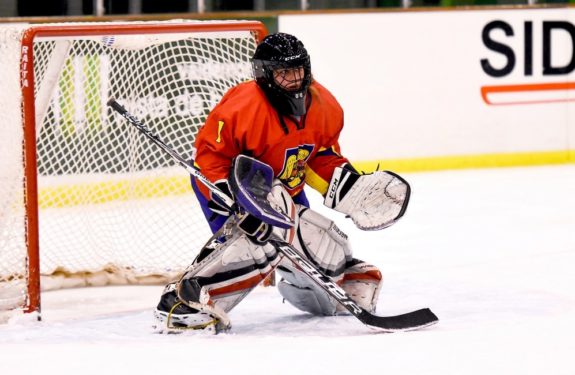
Andrea Kurkó is a 21-year-old goaltender for the Romanian Women’s National Team. She hails from the hometown of Csíkszereda, a primarily Hungarian-speaking region in eastern Transylvania. Kurkó possesses just as much passion for hockey as any North American or Scandinavian player does, even if her row is a little bit harder to hoe.
“I don’t feel old,” Kurkó smiled and told THW, “but unfortunately I can’t play hockey with under-aged boys anymore because of my studies. After hockey, I want to be a nurse and I don’t have enough time. It’s sad but true – I need to learn if I want to earn something, because women’s hockey in my country is not really supported and nobody believes in a girl who wants to play hockey.”
While women’s players in countries such as the USA and Canada are certainly not provided with livable wages or proper benefits, they are still more fortunate than some of their counterparts such as Kurkó – a national team player.
THW interviewed Kurkó at length to find out more about women’s hockey in Romania, and what her own hockey career has been like.
Deciding to Become a Goaltender
Born Jan. 15, 1998, Kurkó has been playing hockey for roughly a decade. She started initially as a skater, but ended up becoming a goaltender instead.
“Sincerely, as a player I was weak and slow,” Kurkó recalled. “But I always wanted to somehow protect my team as a defense. Then my coach asked me if I wanted to be a goalie because our team needed one. There were also two U-12 boys teams that needed a goalie, and my coach told me I have more of a chance to become a good goalie with boys than a good (skater) on a girls team.”
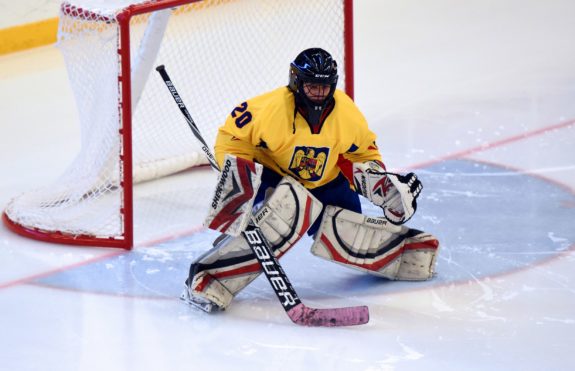
Kurkó has played primarily as a goaltender ever since the 2005-06 season. She has backstopped her country at two different IIHF women’s qualification tournaments – one at the U18 Division I level and one for the Romania’s Women’s National Team for Division II. Additionally, she has competed with the National Team at the 2017, 2018 and 2019 IIHF Division II-B World Championships.
“When I started to practice with the boys,” she remembered, “it was sincerely so hard to be the single girl on a boys team. The boys were always faster, better than me. But I really wanted to be as good as they were, and I was there in every single practice to be better. I stayed on boys teams from U12 to U20, all the while playing with girls too.”
Being From Romania and Being From “Little Canada”
A hockey town is a hockey town, no matter what country it may lay within. When you consider programs such as Rogers Hometown Hockey and Kraft Hockeyville, it makes you wish that there were similar organizations that had more of a global reach. Perhaps if there were, they would find their way to Csíkszereda.
“I can say that my hometown is all about hockey,” Kurkó stated proudly. “Every single person knows something about hockey, plays hockey or watches hockey. My hometown is a “little Canada” and because of this, I love this city.”
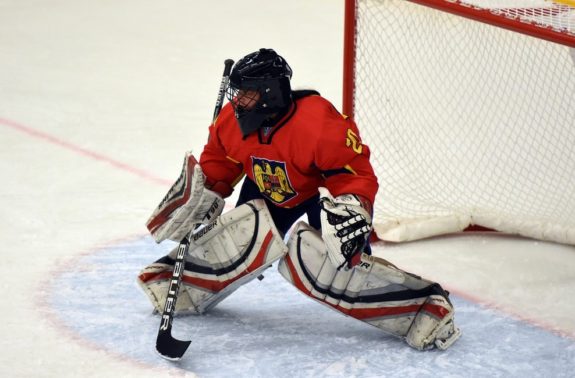
No Romanian player has yet to make it to the NHL or NWHL in North America. That does not mean, however, that the country has been without its hockey heroes. The Romanian Men’s National Team has competed in four different Olympics beginning in 1964. Eduard Pană was the first Romanian to be inducted into the IIHF Hall of Fame in 1998, followed by Doru Tureanu in 2011. We are still waiting for the first Romanian woman to receive induction.
“I can’t say that I have an idol or a particular athlete whom I admire,” Kurkó thought and pondered. “I think every goalie is different, and I don’t want to model other goalies’ games. I want to try my best in every game and learn from my mistakes. I like to be a goalie because in my opinion goalies are special and rare.
She went on to say:
“It’s not easy to be a goalie. First of all, you need to be a little crazy to enjoy being in danger. I love that feeling when everything depends on me in the net. If my team wins because I helped them with my saves, and when every teammate jumps at me, it’s a feeling I can’t describe.”
Plenty More to Learn as a Netminder
One of the difficulties a goalie faces is the over-importance that is oftentimes placed upon statistics, and how they might look on a database website or in a media guide. Playing for a national hockey program that is still very much in development means that there is typically some unflattering numbers that coincide.
Kurkó’s numbers from her World Championship performances amount to goals-against average totals of 7.67, 9.61 and 5.59 for 2017, 2018 and 2019 respectively. That is accompanied by save percentages of .869, .816 and .876 as well. Those totals for Kurkó were generated across 10 different games.
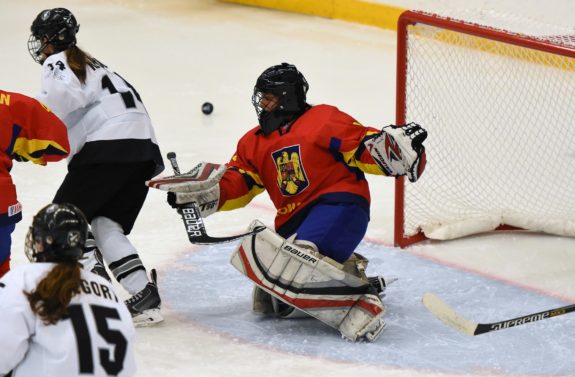
But those numbers are very deceiving. More often than not, Kurkó faced at least 50 shots a game. In a Mar. 5, 2017 game against New Zealand, 76 shots were fired her way and she stopped 67 of them. Kurkó backstopped Romania to a 5-4 overtime win over Turkey on Apr. 7, 2019 when she made 41 saves. Her heroics even earned her the IIHF’s Team’s Top Player award for Romania at the 2019 tournament – a feat she accomplished on Romanian home ice.
Kurkó’s National Pride
“I can’t say that I am a very good goalie,” Kurkó said in complete modesty. “But if I really want something with all my heart, and I focus 100-percent, I can do anything. I think this is what helps me in every game – my heart. Because this sport really means so much for me and my teammates. They really believe in me. They give me (strength) to never give up and to believe in myself.”
Statistics have no bearing on the national pride an athlete feels when she or he represents their country. Even if it is not the same country as their birthplace, which is Kurkó’s case. And as self-deprecating as she may be,
Kurkó makes no mention of numbers whatsoever, other than to state the frequency.
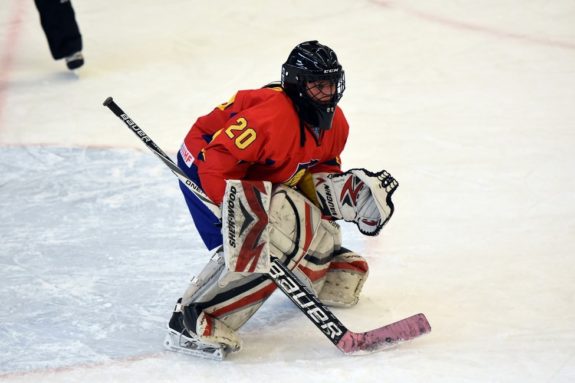
“I have represented Romania at five different World Championship tournaments,” she stated, “and it is a pleasure and an honor. I’m actually Hungarian, but I feel half-Romanian. I play every single game for the logo on the front of my jersey, with all my heart. I had a lot of amazing moments at those five World Championships, but my favorite was in this year when I got the MVP for Team Romania at home in front of all the supporters who really believed in me.”
Sport Club Csíkszereda and Further Life Lessons
When Kurkó is not playing for her country, she is back in Csíkszereda playing for her club team. As we touched upon earlier, it is important that we are each thankful for the opportunities that we have. Kurkó certainly is. And while the Romanian club league that she plays in may be modest in size, it is no less essential to her life and to her town.
“My team’s name is Sport Club Csíkszereda Women’s Hockey, Kurkó explained, “and we have been champions since 2001. Unfortunately, in our league there are just three teams. But I think this situation will be made better if someone finally realize that girls can and want to play hockey – not just for a hobby, and not just in these circumstances.”
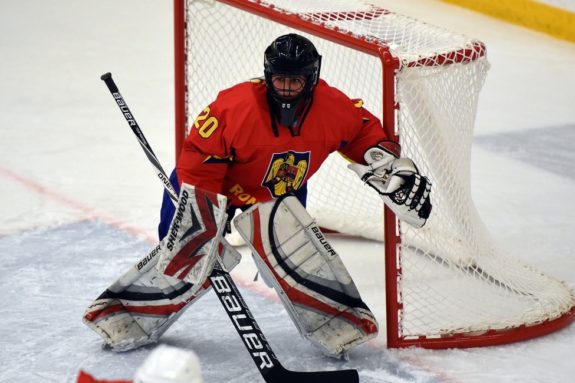
A sentiment that indeed sounds familiar and rings true among many of
Kurkó’s colleagues from other countries – namely North America.
Saying that though, Kurkó is not of the mindset that some independently wealthy savior will come to Romania and wave a magic wand. If hockey has taught her anything, it is that life takes continuous effort and diligence in order to make something better than before – that includes hockey.
“I think I have learned a lot from playing hockey,” Kurkó reflected. “I learned first of all what it means to be part of an amazing team with teammates who became my second family. I learned to be independent and fix my problems by myself. And I think I have learned that the most important thing is to to never give up. It doesn’t matter how hard it is – quitting is not acceptable.”